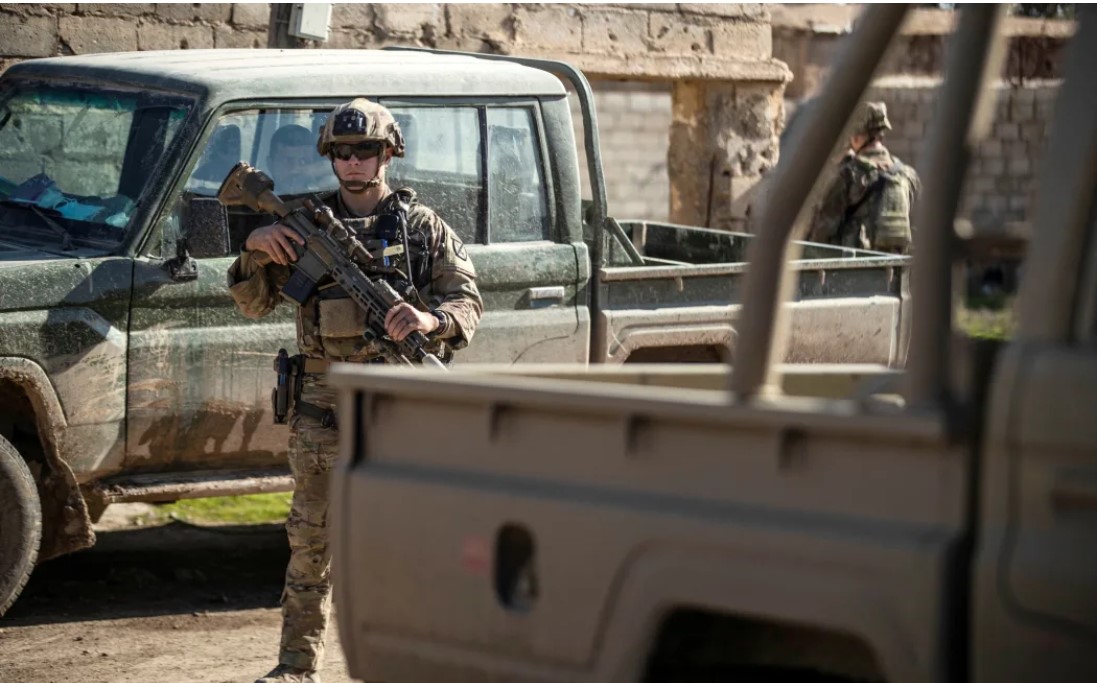The US has approved plans for a series of strikes on Iranian targets in Syria and Iraq, officials have told the BBC’s US partner CBS News.
The strikes will take place over a number of days, officials said, and weather conditions will likely dictate when they are launched.
It comes after a drone attack killed three US soldiers in Jordan, close to the Syrian border, on Sunday.
The US blamed an Iranian-backed militia group for that attack.
That group, the Islamic Resistance in Iraq, is believed to contain multiple militias that have been armed, funded and trained by Iran’s Revolutionary Guards force. It has said it was responsible for Sunday’s strike.
Iran, meanwhile, has denied any role in the attack which injured 41 other US troops at the military base, known as Tower 22.
US officials have said that US intelligence believes that the drone used to attack the facility was manufactured by Iran – and is similar to the drones Iran has been sending to Russia for its invasion of Ukraine.
At a news conference on Thursday, US Defence Secretary Lloyd Austin defended the delayed military response, saying: “We will respond where we choose, when we choose and how we choose.”
“I think everyone recognises the challenge associated with making sure that we hold the right people accountable,” he said, adding that there is no “set formula for doing this”.
“There are ways to manage this so it doesn’t spiral out of control. And that’s been our focus throughout,” Mr Austin continued.
The officials who spoke to CBS News did not give an exact timeline on the potential strikes. They said the US military could launch them in bad weather, but preferred to have better visibility to reduce the risk of inadvertently hitting civilians.
President Joe Biden has been under mounting pressure from Republican lawmakers, including some of Washington’s most hawkish voices on Iran, to strike targets on Iranian soil.
But while the US has repeatedly pledged to respond to the drone attack, Mr Biden and other defence officials have said Washington is not seeking a wider war with Iran or an escalation of tensions in the region.
“That’s not what I’m looking for,” Mr Biden told reporters at the White House earlier this week.
The reportedly approved plans appear to keep the targeting to Iranian targets Syria and Iraq, rather than inside Iran.
Several Iran-backed groups have increased attacks on US and Israeli-linked entities since the beginning of the Israel-Hamas war on 7 October.
The Iran-backed Houthis in Yemen, for example, have attacked ships in the Red Sea and Gulf of Aden, prompting strikes from the US and its allies.
A US defence official told CBS that a drone was shot down overnight in the Gulf of Aden, while an unmanned sea drone was struck and destroyed in the Red Sea.
Citing unnamed sources, Reuters on Thursday reported that Iran had withdrawn senior officials from Syria following a series of Israeli airstrikes in a bid to avoid being directly drawn into a wider conflict in the region.
US officials told CNN this week that there were signs that the Iranian government was becoming increasingly concerned about the actions of its proxy groups in the region, who have launched over 160 attacks on US forces since October.
The bodies of the three US soldiers killed in the attack in Jordan are expected to be repatriated to a Delaware Air Force base on Friday. The White House has announced that President Biden will attend.
The three soldiers have been named as William Jerome Rivers, 46, Kennedy Ladon Sanders, 24, and Breonna Alexsondria Moffett, 23. All three were part of an army reserve unit based in Fort Moore, Georgia.
Source : BBC




